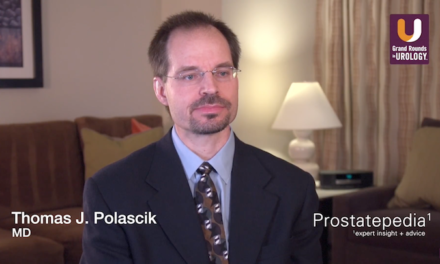David M. Albala, MD, presented “Integrating Theranostics Into a Group Practice” during the 31st International Prostate Cancer Update in July 2021 in Snowbird, Utah.
How to cite: Albala, David M. “Integrating Theranostics Into a Group Practice.” July 2021. Accessed Oct 2025. https://grandroundsinurology.com/integrating-theranostics-into-a-group-practice/
Integrating Theranostics Into a Group Practice – Summary
David M. Albala, MD, Chief of Urology at Crouse Hospital in Syracuse, New York, discusses theranostics and the role it will play in the future of prostate cancer treatment. He explains that theranostics is a management strategy involving the integration of therapeutics and diagnostics that specifically uses targeting molecules labeled with either diagnostic radionuclides or with therapeutic radionuclides for diagnosis of and therapy for a particular malignancy. Dr. Albala states that theranostics works to overcome trial and error methods of finding “one-size-fits-all” solutions in medicine in order to produce personalized medicine. Dr. Albala also discusses PSA and PSMA, explaining that PSMA is used with different ligands such as PSMA-11 and PSMA-617 to treat specific individuals. He reviews how theranostics are used with radionuclide agents to determine localization, examine molecular biodistribution, aid in determining optimal therapeutic dosage, and monitor the patient’s response to treatment. Dr. Albala then reviews data from a trial of Lutetium-177 and PSMA-617 for metastatic castration-resistant prostate cancer that showed Lutetium-based treatment outdoing standard-of-care in median overall survival by 4 months and skeletal event occurrence by 3%. He concludes with a summary of the implications of theranostics for patient care, stating that theranostics leads to more effective disease management and eliminates unnecessary treatments, enhances diagnosis and disease staging, and reduces costs associated with suboptimal diagnostics and treatments.
About The 31st Annual International Prostate Cancer Update:
The International Prostate Cancer Update (IPCU), founded in 1990, is a multi-day CME conference focused on prostate cancer treatment updates with expert, international faculty. It is led by expert physicians and is designed for urologists, medical oncologists, radiation oncologists, and other healthcare professionals involved in the diagnosis and treatment of prostate cancer. Dr. Albala delivered this educational activity during the 31st iteration of the meeting in July 2021 in Snowbird, Utah.
ABOUT THE AUTHOR
David M. Albala, MD, is a Chief of Urology at Crouse Hospital in Syracuse, New York. Dr. Albala is considered a national and international authority in laparoscopic and robotic urological surgery. His clinical interests include minimally invasive treatments for benign prostatic hypertrophy (BPH), the use of fibrin sealants in surgery, and robotic urologic surgery.
Dr. Albala earned his medical degree at Michigan State University in East Lansing. He completed a residency in Surgery at Dartmouth-Hitchcock Medical Center in Lebanon, New Hampshire. He then completed a fellowship in Endourology at Washington University in St. Louis, Missouri. Under the direction of Ralph V. Clayman, Dr. Albala was part of the team that performed the first laparoscopic nephrectomy in humans.
Dr. Albala is a past White House Fellow (1995-1996), who acted as a special assistant to Federico Peña, Secretary of Transportation, on classified and unclassified public health related issues. He has been a visiting professor at numerous institutions across the United States as well as overseas in countries such as India, China, Iceland, Germany, France, Japan, Brazil, Australia, and Singapore. He has done operative demonstrations in over 32 countries and 23 states. Dr. Albala has over 215 publications in peer-reviewed journals and has authored 3 textbooks in endourology and 4 books in general urology. He is currently the Editor-in-Chief of theJournal of Robotic Surgeryand serves on the editorial board forCurrent Opinions in Urology, Reviews in Urology,andUrology Index and Reviews. In addition, he serves as a reviewer for 8 other surgical journals. He is currently on the Board of Directors of the Large Urology Group Practice Association (LUGPA). Dr. Albala is also currently the Visiting Professor of Urology at SUNY Downstate Health Sciences University, College of Medicine. Dr. Albala has been identified (by a Stanford University-led study) as one of the top 2% of scientists in the world.





